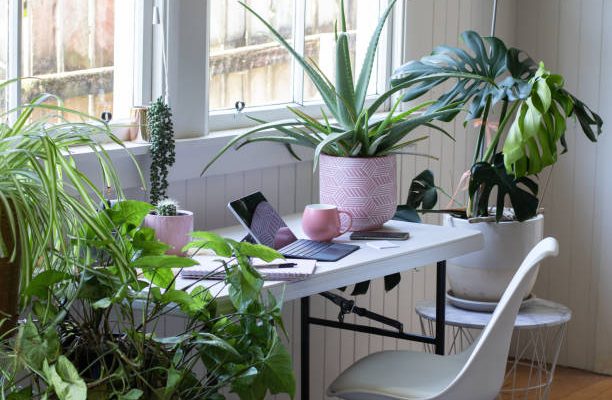The air quality we breathe every day has significantly decreased since climate change worsened. As temperatures increase by the year, allergens and dangerous air pollutants also spread quickly, leading to more cardiovascular and respiratory issues. Unfortunately, indoor air isn’t less of a problem since smoke, vapours, mould, and the chemicals used in manufacturing the products we use affect the air’s condition inside our homes.
Since people spend most of their time inside, indoor air pollution is a severe problem. According to the WHO, around 2.4 billion people worldwide are exposed to harmful levels of household air pollution, which, combined with ambient air pollution, leads to seven million premature deaths annually. Unfortunately, most of the causes of this issue can’t be changed that easily. For example, vehicle fuel and waste incineration have yet to be improved in a more sustainable manner. However, there are some things we can do to minimise the risks of illnesses and improve the quality of our indoor air. Here’s how.
Ventilation
Heating and cooling systems aren’t the best way to freshen up your house. Instead, opening your windows daily in each room increases the amount of outdoor air coming in, which helps better ventilate the rooms. It’s crucial to do this when cooking, painting or heating on kerosene heaters because these are the main activities that affect the quality of the air you breathe.
Natural ventilation also helps control indoor temperatures, which can reduce the level of contaminants inside. However, you could also use mechanical ventilation, such as an HVAC system, but you need to clean it often and adequately to avoid causing more harm than good.
Ideally, you should ventilate your rooms for around 20 minutes, but even five minutes per day improves the air you breathe. You can also open all doors for a few minutes for a more thorough ventilation process, but only if the weather permits and you’re not required to stay inside.
Air cleaners
Getting an air cleaner is also efficient in fighting against poor air quality. Although it’s only designed to remove particles, it can help clean the air quite fast. But you need to know what good products you can rely on because air cleaners need a high-efficiency rate and a good collector. It’s recommended to purchase air cleaners only when the air quality is slightly poor because current technologies can’t eliminate hazardous air particles.
But if you have a health issue, you may prefer an air purifier that can:
- Relieve asthma symptoms;
- Eliminate chemical contaminants;
- Neutralise unpleasant odours;
- Improve sleep;
Many types of air purifiers, such as HEPA filters, electrostatic precipitators and ozone generators, can be found on the market. Regardless of which model you choose for your house, research the benefits and disadvantages of these products on your health before purchasing.
Plants
Indoor plants have plenty of benefits, from boosting your mood and reducing stress to improving indoor air quality. That’s because they can lessen airborne volatile organic compounds (VOC), which are harmful gases that can irritate the eyes, cause nausea and damage the kidneys.
The problem is that plants need to be maintained in good condition, which means you should learn how many times per week they need watering or which ones love the sun and which don’t. You can get some flower pots from https://www.elho.com/en/ and plant some:
- Barberton daisy
- English Ivy
- Snake plant;
- Chrysanthemum
- Spider plant
- Aloe vera
- Broad lady palm
- Weeping fig
If you want to help the environment more, you could also have plants outside the house for them to release oxygen. In that case, outdoor planters are necessary for you to care for plants properly and allow them to grow.
Cleaning
Keeping your house clean is also essential. For example, rugs and carpets can trap dust and other particles between their fibres, which will affect the indoor air. Dust can also get anywhere else, so weekly clearing is vital if you want to contribute to healthy air. It’s also best to perform regular checks around the house and discover potential hazards regarding dust and particle absorbers. Getting rid of dust also includes the following:
- Changing your bedding once a week;
- Cleaning your pillows;
- Tidying your closets;
- Uncluttering your floors;
- Getting a good duster product;
If you struggle with keeping your house clean, many online calendar models provide weekly and monthly schedules that allow you to get things done and then just check them off the list. You can also print them and place them somewhere you always pass by to remember what to focus on that specific day.
Humidity
Humidity is yet another factor affecting the indoor air quality. High levels mean your rooms might be prone to mould, which can irritate your eyes and skin and worsen symptoms in people with asthma. Depending on the region you live in, the climate might be more or less humid. Still, there are ways to control humidity levels inside your house, such as using dehumidifiers and air conditioners. You could also:
- Choose to fry laundry outside since damp clothes increase humidity;
- Clean your gutters often because they usually are the leading cause of indoor water leaks;
- Fix leaking pipes and wrap the exposed ones in insulation to keep condensation from forming;
Humidity can negatively affect your health, such as causing hyperthermia, which might be why you feel dehydrated. It can also contribute to uncomfortable thermal comfort, which makes it difficult for your body to keep cool. It’s recommended that humidity levels are between 40% and 70%. Anything above that can damage peeling paper and paintwork, make furniture and floor rot and cause problems with your walls and brickwork.
Bottom line
Improving indoor air quality can be challenging, mainly when the outside weather contributes to it. However, you must seek methods to correct the levels of indoor polluting because otherwise, your health might be in danger. At the same time, it can also worsen your home’s condition due to high humidity levels and poor cleaning.





















